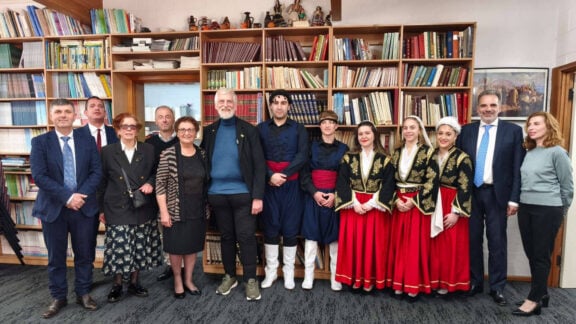International Greek Language Day, established in 2017, is celebrated every year on February 9 to coincide with the commemoration of the birth of Constantine Cavafy, one of Greece’s most renowned poets. Cavafy was born in Alexandria, Egypt in 1863, to Greek parents and his poems are widely considered some of the most significant works in modern Greek literature.
The Greek language is one of the oldest and richest languages in the world, with a history that spans thousands of years. It has been spoken by millions of people over the centuries, including some of the greatest thinkers and scholars in human history. The Greek language is also the foundation of Western civilization, as many of its words and ideas have been adopted into the English language and are still used today.
In a statement published today, Archbishop Makarios of Australia highlighted that Greek language was used by some of the greatest thinkers and philosophers in human history.
“The works of philosophers like Socrates, Plato, and Aristotle were written in Greek, and their ideas have had a profound impact on the development of Western thought (…) Similarly, the epic poems of Homer, such as the Iliad and the Odyssey, were written in Greek and have inspired countless works of literature and art over the centuries.
“In addition to its significance in the realm of literature and philosophy, the Greek language also played an important role in the development of science and mathematics. The works of mathematicians like Euclid and Archimedes, for example, were written in Greek and helped lay the foundations of modern mathematics.”
The Archbishop further stressed that despite its long history, the Greek language has continued to evolve and adapt over the centuries.
“Today, the Greek language is still spoken by millions of people around the world, and it remains an important part of the cultural heritage of Greece and the Eastern Mediterranean.”
On a similar note, reminiscing on the words of Giorgos Seferis, Greece’s Deputy Minister of Foreign Affairs, Andreas Katsaniotis said that on International Greek Language Day, we celebrate the beauty and versatility of the Greek language, which has been the foundation of many of the great works of literature, philosophy, and science throughout history.
“From the epic poems of Homer, to the philosophical works of Aristotle, to the mathematical treatises of Euclid, the Greek language has played a crucial role in shaping our world and our understanding of it.”
“Today, the Greek language is still spoken by millions of people around the world, including those in Greece, Cyprus, and parts of the Eastern Mediterranean. Despite its long history and rich cultural heritage, the Greek language continues to evolve and adapt to the changing needs of its speakers.”
Addressing the Hellenes in Greece and the Diaspora, Mr Katsaniotis said that the importance of the Greek language goes beyond its historical significance, hence, it is paramount to ensure younger generations remain connected to their heritage, even more so since the Greek language is an incredibly important and influential part of Western civilisation.
“The Greek language has a rich vocabulary and grammatical structure that has made it an ideal tool for the expression of complex ideas and concepts. Whether in literature, philosophy, science, or any other field, the Greek language has proven itself to be a versatile and flexible tool that has helped to convey some of the greatest works of human creativity.
“From its roots in antiquity, to its continued use and evolution in the modern day, the Greek language has played a crucial role in shaping the course of human history, and its importance and relevance remain undiminished to this day.”









